Recovery from addiction is a complex and personal journey, and selecting the right treatment option is crucial. Intensive Outpatient Programs (IOPs) offer a structured yet flexible approach to addiction recovery, bridging the gap between inpatient care and independent living. But who is best suited for an IOP? Understanding the purpose and benefits of an IOP can help individuals and their loved ones make informed decisions about their recovery path.
In this article, we’ll explore the structure of IOP, who benefits most from it, and how it fits into the broader continuum of care.
What Is an Intensive Outpatient Program (IOP)?
An Intensive Outpatient Program is a structured form of treatment that allows individuals to receive therapy and support while continuing to live at home. Unlike residential programs, IOPs do not require patients to stay at a facility full-time. Instead, individuals attend scheduled therapy sessions multiple times per week, providing them with intensive care without disrupting their daily lives.
These programs typically involve:
- Individual counseling
- Group therapy
- Family therapy
- Medication management
- Relapse prevention strategies
- Behavioral therapy sessions
Who Should Consider an IOP?
1. Individuals Transitioning from Inpatient Treatment
For those who have completed residential rehab but still require structured support, an IOP can serve as a vital step toward independent recovery. It helps individuals gradually reintegrate into their daily routines while continuing to receive professional guidance.
2. Those with Moderate Addiction Severity
People experiencing mild to moderate substance use disorders may find an IOP suitable. If addiction has impacted their personal and professional life but they still have a stable support system, an IOP provides an effective treatment option.
3. Individuals with Strong Support Systems
Having a supportive home environment is crucial for outpatient treatment. People with family members or friends who encourage their sobriety often do well in an IOP, as they have the emotional and logistical support needed to maintain accountability.
4. Those Who Cannot Commit to Residential Treatment
Work, school, and family responsibilities may make inpatient treatment impractical. IOPs allow individuals to receive structured care while maintaining their obligations, making treatment more accessible.
5. People Experiencing a Relapse
For individuals who have relapsed but do not require detox or full-time care, an IOP offers an opportunity to get back on track. By reinforcing relapse prevention strategies and behavioral therapies, IOPs help individuals regain control over their recovery.
6. Individuals Struggling with Co-Occurring Disorders
Many individuals facing addiction also experience mental health conditions such as depression, anxiety, or PTSD. IOPs provide integrated care for both addiction and mental health challenges, making them ideal for those who need dual-diagnosis treatment.
Benefits of an Intensive Outpatient Program
1. Flexibility and Independence
IOPs provide a structured approach to recovery without requiring individuals to put their lives on hold. Participants can continue working, attending school, or fulfilling family responsibilities while receiving treatment.
2. Access to Professional Therapy and Support
A key advantage of an IOP is access to evidence-based therapies such as Cognitive Behavioral Therapy (CBT) and Dialectical Behavior Therapy (DBT). These approaches help individuals develop coping skills and address underlying triggers.
3. Cost-Effective Treatment
Compared to inpatient rehab, IOPs tend to be more affordable while still offering high-quality care. Insurance providers often cover a portion of outpatient treatment, making it a viable option for many individuals.
4. Community and Peer Support
Group therapy sessions foster a sense of community, allowing individuals to connect with others who share similar experiences. Peer support is a crucial aspect of recovery, providing encouragement and shared insight.
5. Accountability and Relapse Prevention
Regular meetings with therapists and support groups help individuals stay accountable. Learning relapse prevention techniques and developing a structured routine significantly improve long-term success rates.
What to Expect in an IOP Schedule
Every client’s treatment plan is personalized, but most IOP programs include:
-
Group Therapy: Relapse prevention, emotional regulation, communication skills, and peer support
-
Individual Therapy: Trauma work, goal setting, and behavioral change
-
Psychiatric Care: Medication management and mental health stabilization
-
Holistic Services: Yoga, mindfulness, nutrition education
-
Case Management: Life skills, job readiness, and discharge planning
IOP is typically offered 3–5 days a week and can last anywhere from 6 to 12 weeks, depending on individual needs and progress.
IOP vs. Other Levels of Care
| Level of Care | Hours per Week | Residential Requirement | Best For |
|---|---|---|---|
| Inpatient / Residential | 24/7 | Yes | Severe symptoms, detox, crisis stabilization |
| Partial Hospitalization Program (PHP) | 20–30 | No | Step-down from inpatient or moderate symptoms |
| Intensive Outpatient Program (IOP) | 9–15 | No | Mild/moderate symptoms, post-residential care |
| Outpatient Therapy | 1–2 | No | Maintenance, relapse prevention |
Choosing the Right IOP
When selecting an Intensive Outpatient Program in Waltham, MA, consider the following factors:
- Accreditation and Licensing: Ensure the facility is licensed and follows best practices.
- Treatment Approach: Look for evidence-based therapies and personalized care plans.
- Staff Qualifications: A multidisciplinary team of therapists, counselors, and medical professionals ensures comprehensive support.
- Aftercare Planning: Long-term recovery requires ongoing support, so an IOP with strong aftercare options is ideal.
Why Choose Evoke Waltham for IOP?
Choosing the right IOP is critical. At Evoke Waltham, we provide:
-
Dual diagnosis expertise for those with mental health and addiction issues
-
Evidence-based therapy such as CBT, DBT, and trauma-informed approaches
-
Individualized care plans to fit your goals and history
-
A caring, licensed clinical team dedicated to your success
-
Supportive group settings that encourage connection and accountability
Whether you’re stepping down from a Partial Hospitalization Program or starting structured care for the first time, our Intensive Outpatient Programs in Waltham, Massachusetts are here to support your journey.
Conclusion
If you’re seeking recovery support that fits your life, an Intensive Outpatient Program may be the solution. IOP offers the structure and clinical care you need—while giving you the freedom to live, work, and grow.
Whether you’re struggling with addiction, mental health challenges, or both, Evoke Waltham is here to help. Call us today at 866.395.3110 to learn more about our Addiction Treatment Programs in Waltham, Massachusetts, and find out if IOP is the right next step for your recovery.
FAQs
How long does an Intensive Outpatient Program last?
Most IOPs last between 8 to 12 weeks, but the duration may vary based on individual progress and treatment needs.
Can I work while attending an IOP?
Yes, IOPs are designed to accommodate work and personal responsibilities by offering flexible scheduling options.
Is an IOP effective for long-term recovery?
Yes, studies show that IOPs are highly effective when combined with continued aftercare and a strong support system.
Does insurance cover Intensive Outpatient Programs?
Many insurance providers cover IOPs, but coverage details vary. It’s best to check with your provider for specific benefits.
How do I know if an IOP is right for me?
If you need structured treatment but cannot commit to residential care, have a supportive home environment, and require professional therapy, an IOP may be the right fit.



